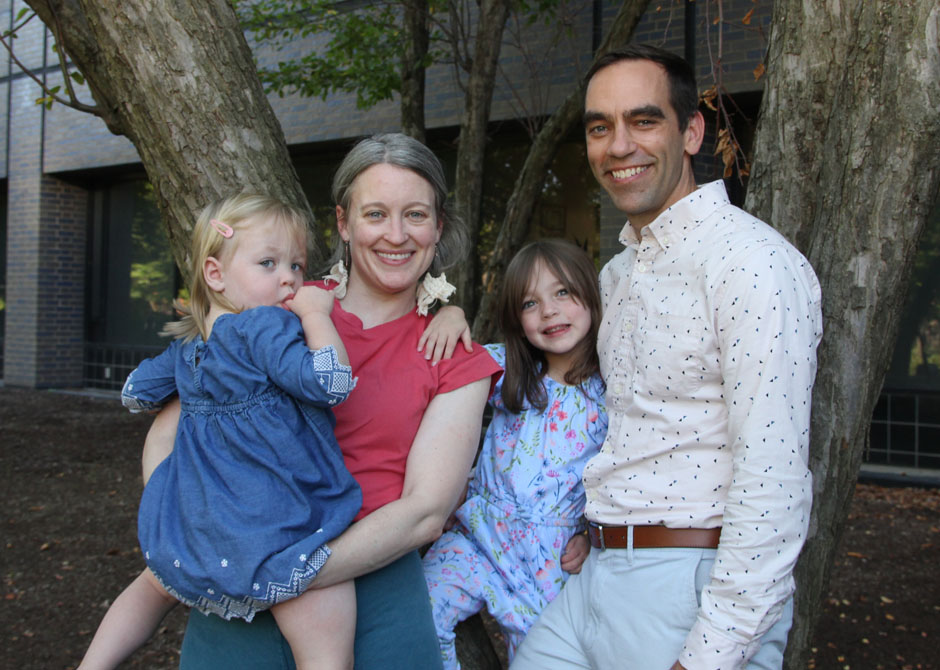Rehabilitation and Participation Science
Program in Occupational Therapy
by Stephanie Stemmler • September 22, 2022

The Oberle Family (left to right): Ellis, Sarah, August Ann and Kyle.
Sarah Cheatham Oberle, OTD, OTR/L, is a strong advocate for increased resources that support early childhood development. A pediatric occupational therapist, Oberle is part of the Program in Occupational Therapy’s Clinical Services Program and works onsite with children ages 3-12 at the Central Institute for the Deaf. Her role there enables her to engage both children and their families in resource identification and cognitive skills development.
A chance email from a colleague in the Program prompted Oberle to take her advocacy to a national level. This year, she; her husband, Kyle; and their two children, August Ann, age 4, and Ellis, age 2, served as the Missouri family representative for Think Babies’ Strolling Thunder 2022.
Think Babies is the advocacy arm for the ZERO TO THREE National Center for Infants, Toddlers and Families. Established in 1973, ZERO TO THREE focuses on the first three years of a child’s life and works to translate research related to early childhood development into solutions that have a direct impact on families.
“The key for the organization is that sensory pathways such as hearing, language and higher cognitive function all peak by the first three years of life,” notes Oberle. “Therefore, it advocates for programs needed to ensure that children thrive in those early years.”
As part of the organization’s advocacy efforts, Think Babies coordinates an annual event called Strolling Thunder to directly connect families with elected officials. Several key issues for reform are highlighted, including increased paid family leave; high-quality, affordable childcare; funding for early Head Start programs; and more services targeting infant and early childhood mental health. It’s the last issue that caught Oberle’s eye—and passion.
“We are very transparent in that my husband is diagnosed with bipolar disorder and still is a fully functioning adult with a full-time career as a high school Spanish teacher, and we have a wonderful family,” says Oberle. “We also had to handle the challenges of raising a child who really needed mental health services as a toddler. So I looked at the Strolling Thunder advocacy issues and realized I could represent not only as an occupational therapist, but also as a parent who needed to find these services.”
Oberle recalls the time when the challenges in her family became overwhelming. In the spring of 2020, the COVID-19 pandemic hit. Six weeks into the pandemic, Oberle gave birth to her second child. “In the midst of all that, Kyle had a manic episode and was hospitalized for a short period of time. I was by myself with a newborn and a toddler who still had huge tantrums, and I really was just in survival mode.”
Periodically while at work, Washington University would send mental health awareness alerts to all employees to help handle the stress of COVID and other aspects of life. In one that Oberle received, there was a list of child psychology services. She asked for an appointment, and soon August Ann was receiving the treatment she needed, and Kyle and Sarah were enrolled in parenting therapy, which taught them coping and intervention strategies. As they were made aware of all the resources that were available, Oberle then received the “ping” about Think Babies.
“I immediately saw the whole landscape from personal to professional, and I decided to jump on this opportunity,” she says. In May, she was among family representatives from all 50 states and the District of Columbia who participated in Strolling Thunder 2022. The virtual event brought her and others into direct contact with elected officials to advocate for more resources to support early childhood development. “I did feel like I was heard, and telling my own story was therapeutic.”
In addition to her work at the Central Institute for the Deaf, Oberle provides occupational therapy services for children transitioning from a Neonatal Intensive Care Unit (NICU) to home. She also mentors doctoral students in the Program’s Deafness Occupational Therapy Support (DOTS) Laboratory, which works to combine occupational therapy with skills development and cognitive enhancement for children with hearing loss. Within the lab, Oberle created Train Your Brain, a hands-on, curriculum-based cognitive development program designed for children ages 8-16. Train Your Brain is now used in after-school programs in the region for children with hearing loss.
Of her time with Think Babies, Oberle adds, “I really hope that seeing it from both sides and talking about my experiences carries weight. Working with Think Babies gave me a new perspective. I’ve been the client and the parent. I’m advocating on the professional level now, and it inspires me to do more.”
We welcome inquiries from prospective students, potential collaborators, community partners, alumni and others who want to connect with us. Please complete the form below to begin the conversation.
Schedule an Info Session
We are excited that you are considering applying to the Program in Occupational Therapy at Washington University. Please join us for a Zoom Information Session for either our entry-level MSOT or OTD degrees or our online Post-Professional OTD. Current faculty members will discuss the degree program and answer any question you may have. We are offering these sessions on the following days and times. The content is the same for each one, so you only need to sign up for one.
Upcoming ENTRY-LEVEL Degree ZOOM Info sessions:
Schedule an Entry-Level Info Session
Upcoming PP-OTD Degree ZOOM Info session: